Kerala.com Travel Division is approved as an Inbound Tour Operator by the Ministry of Tourism, Govt of India and the Department of Tourism, Government of Kerala
CHEMBAI VAIDYANATHA BHAGAVATAR
![]() Chembai Vaidyanatha Bhagavatar was a Carnatic music singer from Palakkad (state of Kerala, India). Known by his village name Chembai, or simply as Bhagavatar, he was born to Anantha Bhagavatar and Parvati Ammal in 1895. Chembai was noted for his powerful voice and majestic style of singing. His first public performance was in 1904, when he was nine. He was a recipient of several titles and honours. He was known for his encouragement of upcoming musicians, and also for his ability to spot new talent.[1] He was responsible for popularizing compositions like Rakshamam, Pavana Guru, among others.[citation needed] The music critic 'Aeolus' describes him as "the musician who has meant the most to Carnatic Music in the first fifty years of the 20th century" Some of his prominent disciples include Yesudas, T. V. Gopalakrishnan, V.V.Subramaniam, P.Leela, among others.Many memorial music festivals are held in his honour annually since his death in 1974, the most important being the annually celebrated Chembai Sangeetholsavam.
Chembai Vaidyanatha Bhagavatar was a Carnatic music singer from Palakkad (state of Kerala, India). Known by his village name Chembai, or simply as Bhagavatar, he was born to Anantha Bhagavatar and Parvati Ammal in 1895. Chembai was noted for his powerful voice and majestic style of singing. His first public performance was in 1904, when he was nine. He was a recipient of several titles and honours. He was known for his encouragement of upcoming musicians, and also for his ability to spot new talent.[1] He was responsible for popularizing compositions like Rakshamam, Pavana Guru, among others.[citation needed] The music critic 'Aeolus' describes him as "the musician who has meant the most to Carnatic Music in the first fifty years of the 20th century" Some of his prominent disciples include Yesudas, T. V. Gopalakrishnan, V.V.Subramaniam, P.Leela, among others.Many memorial music festivals are held in his honour annually since his death in 1974, the most important being the annually celebrated Chembai Sangeetholsavam.
EZHUTHACHAN
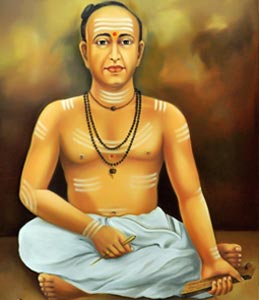 Thunjathu Ramanujan Ezhuthachan was an Indian poet from around the 16th or 17th century, known as the father of the Malayalam language—which is the principal language of the Indian state of Kerala, spoken by 36 million people in the world.In his era, Vattezhuttu, an old script originally used to write Tamil, was generally used in Kerala to write this language. However, he wrote his Malayalam poems in Arya-ezhuttu, a Grantha-based script originally used to write Sanskrit, so that he could accurately transliterate Sanskrit words into Malayalam. His works became unprecedentedly popular, which also popularized the writing system adopted by him, and that is the current Malayalam alphabet.
Thunjathu Ramanujan Ezhuthachan was an Indian poet from around the 16th or 17th century, known as the father of the Malayalam language—which is the principal language of the Indian state of Kerala, spoken by 36 million people in the world.In his era, Vattezhuttu, an old script originally used to write Tamil, was generally used in Kerala to write this language. However, he wrote his Malayalam poems in Arya-ezhuttu, a Grantha-based script originally used to write Sanskrit, so that he could accurately transliterate Sanskrit words into Malayalam. His works became unprecedentedly popular, which also popularized the writing system adopted by him, and that is the current Malayalam alphabet.
He was born in Trikkantiyur , near the town of Tirur, in Kerala. At that time,it was a part of Vettattnad. His personal name is Ramanujan. Thunchaththu is his “family name”, and Ezhuthachan (schoolmaster) is an honorific title or the last name indicating his caste. His name is transliterated in several different ways, including Thunchath Ezhuthachan, Thunchaththu Ezhuthachan, and Thunjath Ezhuthachan.
KUMARAN ASAN
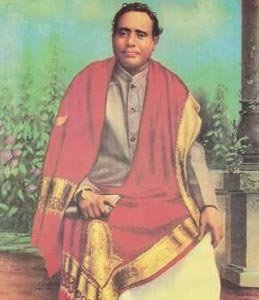 TN. Kumaran Asan (1873–1924) also known as Mahakavi Kumaran Asan, (the prefix Mahakavi awarded by Madras University in the year 1922 means "great poet" and the suffix Asan meaning scholar or teacher) was one of the triumvirate poets of Kerala. He was also a philosopher and a social reformer. More than that he was one of honoured disciple of Sree Narayana Guru.
TN. Kumaran Asan (1873–1924) also known as Mahakavi Kumaran Asan, (the prefix Mahakavi awarded by Madras University in the year 1922 means "great poet" and the suffix Asan meaning scholar or teacher) was one of the triumvirate poets of Kerala. He was also a philosopher and a social reformer. More than that he was one of honoured disciple of Sree Narayana Guru.
Kumaran Asan initiated a revolution in Malayalam poetry in the first quarter of the 20th century, transforming it from the metaphysical to the lyrical. Deep moral and spiritual commitment is evident in Asan's poetry. His works are an eloquent testimony of poetic concentration and dramatic contextualization.
E M S NAMBOOTHIRIPAD
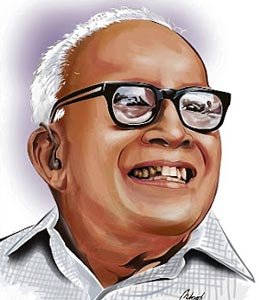 Shri E.M.S. Namboodirippad, popularly known as EMS, holds pride of place as the first Chief Minister of unified Kerala. A staunch and committed socialist, historian and Marxist theorist, he had the rare distinction of having led to power, through the ballot, the first democratically elected Communist government in the world.
Shri EMS was born on June 14, 1909 in Perinthalmanna taluk of Malappuram district. His father was Shri Parameswaran Namboodirippad, whom he lost in the early years of his life. His mother, Smt. Vishnudatta Antharjanam, played a vital role in his life and deeply influenced him. Even though his formal education started very late, he studied Sanskrit, the Vedas and the Upanishads with the help of a tutor at home.
Shri E.M.S. Namboodirippad, popularly known as EMS, holds pride of place as the first Chief Minister of unified Kerala. A staunch and committed socialist, historian and Marxist theorist, he had the rare distinction of having led to power, through the ballot, the first democratically elected Communist government in the world.
Shri EMS was born on June 14, 1909 in Perinthalmanna taluk of Malappuram district. His father was Shri Parameswaran Namboodirippad, whom he lost in the early years of his life. His mother, Smt. Vishnudatta Antharjanam, played a vital role in his life and deeply influenced him. Even though his formal education started very late, he studied Sanskrit, the Vedas and the Upanishads with the help of a tutor at home.
O V VIJAYAN
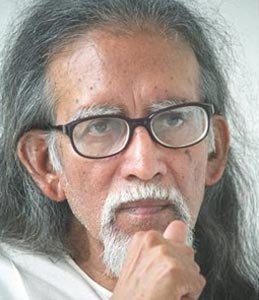 Ootupulackal Velukkuty Vijayan (July 2, 1930 – March 30, 2005) was an Indian author and cartoonist, who was an important figure in modern Malayalam literature. Best known for his first novel Khasakkinte Itihasam, Vijayan has six novels, nine short-story collections, and nine collections of essays, memoirs and reflections.
Ootupulackal Velukkuty Vijayan (July 2, 1930 – March 30, 2005) was an Indian author and cartoonist, who was an important figure in modern Malayalam literature. Best known for his first novel Khasakkinte Itihasam, Vijayan has six novels, nine short-story collections, and nine collections of essays, memoirs and reflections.
Vijayan wrote his first short story, "Tell Father Gonsalves", in 1953. He went on to write five novels and translated a significant portion of his own work into English. His first and most famous novel, Khasakkinte Itihasam (The Legends of Khasak, 1969) tells the story of a teacher named Ravi dispatched to a newly created school in remote Khasak. He brought about a sea-change in Malayalam literature with this novel: so much so that it can be divided into pre-Khasak and post-Khasak eras, named after Vijayan's pioneering first novel. The former era was romantic and formal; the latter is modernist, post-modernist and post-post-modernist, with tremendous experimentation in style and content. In a way, Vijayan released Malayalam fiction writing from the shackles of tradition. He wrote many other short stories, essays and satire. He was also an editorial cartoonist whose works appeared in various news publications including The Statesman and the Far Eastern Economic Review. He also worked for The Hindu.
M T VASUDEVAN NAIR
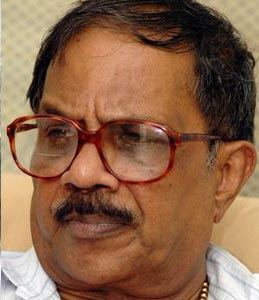 Madathil Thekkepaattu Vasudevan Nair (born 9 August 1933), popularly known as MT, is a renowned Indian author,screenplay writer and film director. He was born in Kudallur, a small village in the present day Palakkad District, which was under the Malabar District in the Madras Presidency of the British Raj. He is one of the most prolific and versatile writers in modern Malayalam literature. In 2005, India's third highest civilian honour Padma Bhushan was awarded to him. He was awarded the highest literary award in India Jnanpith for his work Randamoozham (Second Turn).
Madathil Thekkepaattu Vasudevan Nair (born 9 August 1933), popularly known as MT, is a renowned Indian author,screenplay writer and film director. He was born in Kudallur, a small village in the present day Palakkad District, which was under the Malabar District in the Madras Presidency of the British Raj. He is one of the most prolific and versatile writers in modern Malayalam literature. In 2005, India's third highest civilian honour Padma Bhushan was awarded to him. He was awarded the highest literary award in India Jnanpith for his work Randamoozham (Second Turn).
